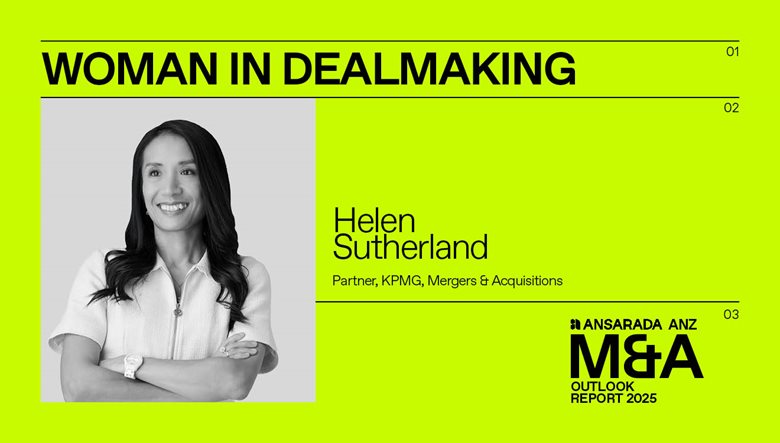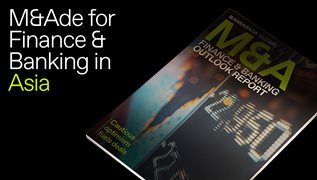KPMG's Helen Sutherland: M&A momentum building as new laws loom
Helen shares how proposed ACCC regulations will affect deal timelines and her strategy to complete deals before 2026.
By AnsaradaWed Jun 11 2025Mergers and acquisitions, Industry news and trends, Innovation

Helen Sutherland, Partner at KPMG Mergers and Acquisitions expects new M&A laws in Australia to trigger an active deal market.
In this excerpt from our 2025 ANZ Women In Dealmaking M&A Outlook Report, which features insights from 12 of Australia’s leading female dealmakers, Helen shares her M&A market outlook, the impact of new competition laws, and emerging trends in due diligence.
A surge in deal activity in Australia and New Zealand is widely anticipated in 2025, with new M&A laws likely to encourage the buy side and sell side to complete transactions before they come in on 1 January 2026.
“We’re optimistic about the M&A outlook. Compared to this time last year, we are significantly busier and our pipeline is much fuller. It feels like there’s more momentum and willingness to get deals done,” says KMPG Mergers and Acquisitions Partner, Helen Sutherland.
Several factors are likely to contribute to the expected uptick in M&A activity this year. These include a more stable economic environment, a narrowing gap between buyer and seller valuation expectations and a backlog of deals waiting for the right market conditions.
“Everyone hoped for a lot of activity at the start of 2024, but it didn’t really materialize until the last few months of 2024. Now, there’s a noticeable pick-up in activity. People are more focused on getting deals done,” Helen explains.
Nevertheless, due diligence is taking longer, with more extensive checks being conducted. “There’s just more diligence being done. It’s not that buyers and sellers don’t want to get the deal done, but there is more scrutiny and this results in a longer process,” Helen adds.
Cybersecurity and compliance with data privacy regulations are front-of-mind for buyers and sellers, particularly in deals involving personal information. “We are seeing penetration testing being done by the buyer more frequently during due diligence, especially if this is not routinely undertaken by the seller. Cyberattacks are not covered by warranty and indemnity insurance and can be seen as a black hole that most buyers are not prepared to take any risk on,” Helen says.
Payroll and wage compliance is also continuing to represent a key focus area for buyer due diligence, particularly in labour intensive industries such as healthcare services, manufacturing and construction. These industries often operate highly complex and ever evolving awards regimes that are difficult to interpret and can be challenging for employers to remain compliant.
Despite the heightened due diligence process, mid-market acquisitions remain a key focus for trade buyers who are seeking acquisitions with a strong strategic fit. “Trade buyers ideally like to have completed all of their internal market research and leadership buy-in before committing to an acquisition process. They need to believe they can add value and be better owners than the current shareholders,” she adds.
Private equity firms remain generally sector agnostic but are particularly interested in assets with highly defensive characteristics and genuine differentiation, all of which should be reflected in an attractive margin profile. Sectors that continue to remain sought after include technology, healthcare, education and defence, with electrification another big theme.
“The mid-market private equity firms we work with are prepared to play the energy transition trend in various ways, as ownership of the infrastructure is not within their mandate. We are seeing strong interest in energy management software, electric vehicle charging products and services, as well manufacturing and distribution businesses that supply products into energy infrastructure,” Helen says.
Helen says proposed amendments to Australian competition laws that define the scope of deals that need to go through ACCC approvals may have unintended consequences.
“The proposed regulations may catch deals that don’t really need scrutiny from a competition perspective, creating conditionality and additional administrative cost on both buyers and sellers. The way the proposed laws stand, many more mid-market deals will need clearance due to the low thresholds, which will push out timeframes for completion,” she says.
While a voluntary disclosure regime kicks in from 1 July 2025, official declarations to the ACCC won’t be required until 1 January 2026.
“This year we will be pushing for deals to complete before the end of the year to avoid unnecessary delays,” Helen adds.
While KPMG is developing AI tools to make the deal process more efficient, the human element remains crucial. “AI will help with routine tasks like data book preparation and document summarization, but it’s still necessary for someone to review the outputs of AI to ensure accuracy and the nuance is reflected,” she says.
“Relationship-driven deal sourcing remains key. We develop trusted relationships over time and are there when the time is right. The human element in deal-making is irreplaceable.”
Helen’s career in deal-making began with an internship at Credit Suisse in New Zealand. “I didn’t grow up in a finance-oriented household and didn’t know much about investment banking. The internship experience was eye-opening and I realised I wanted to be an investment banker,” she says.
On a personal level, she’s motivated by delivering results for clients. “The deals we work on are often transformational for individuals and their families.” Helen’s advice to emerging women in finance is to seize opportunities to work with great people, build relationships and never be afraid to ask questions.
“M&A allows you to work with incredible founders and management teams and learn how they’ve made their business a success. That’s what keeps it new and exciting. Getting the deal done is great but being able to set someone up for the next phase of their life is even more rewarding.”


